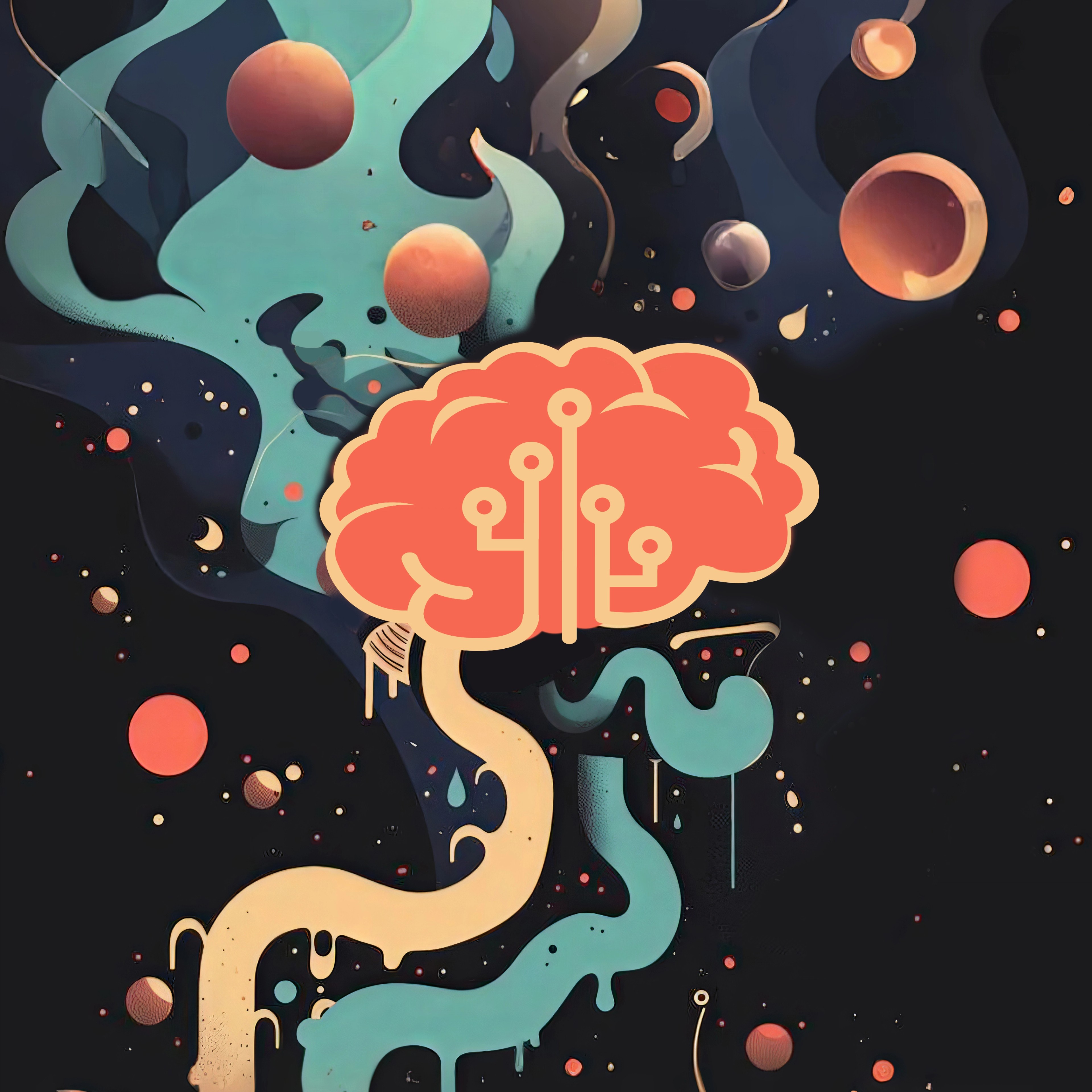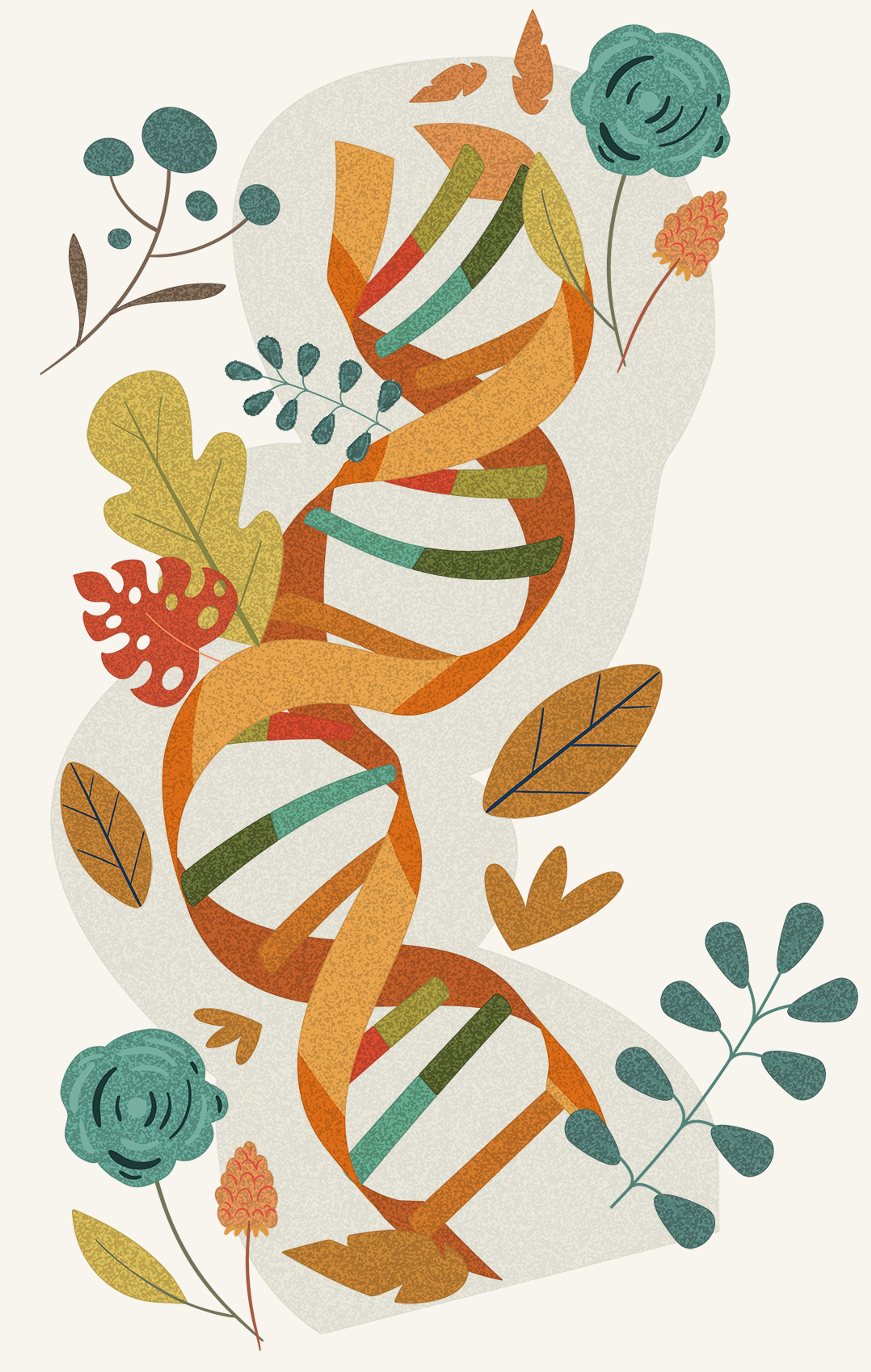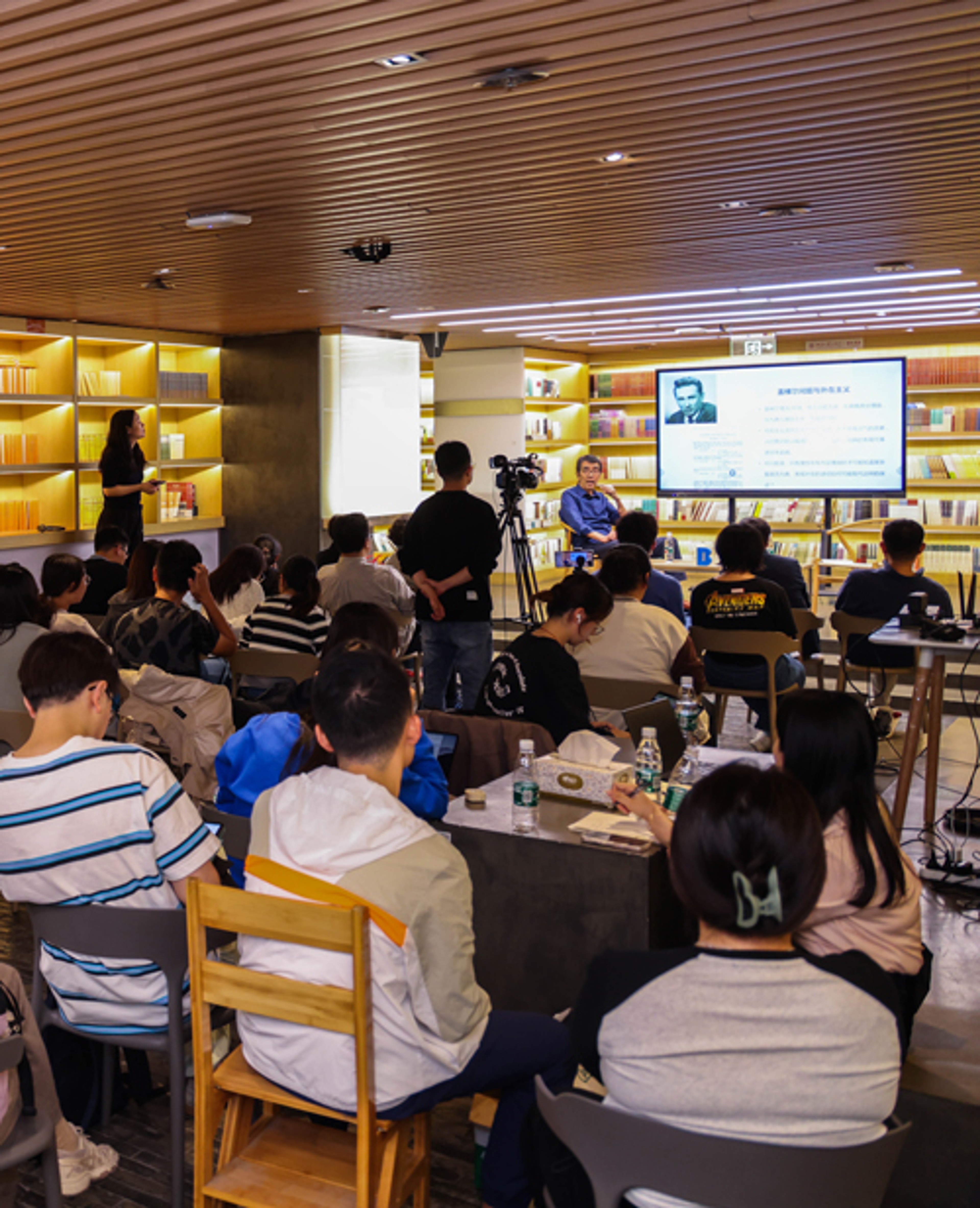The Intuition Trap: Exploring How Evolutionary Psychology Explains Contemporary Misconceptions
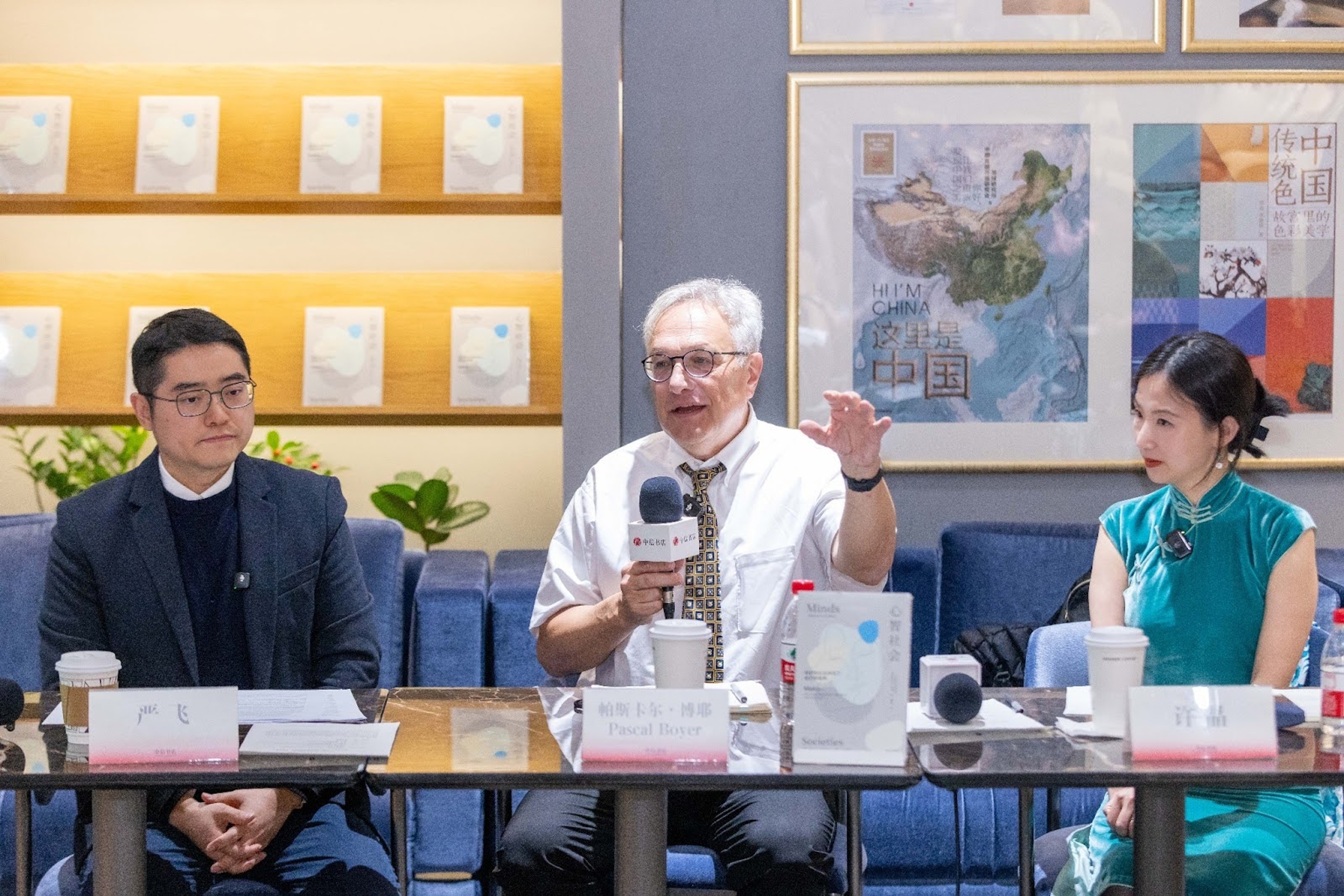
- Date: October 18, 2025
- Location: CITIC Bookstore, Sanlitun, Chaoyang District, Beijing
The boundaries between “us” and “them” are built through history, culture, and power. They can be reshaped.
On October 18, 2025, the 40th Berggruen Seminar, titled “The Intuition Trap — Exploring how Evolutionary Psychology Explains Contemporary Misconceptions” was held at the CITIC Bookstore in Sanlitun, Beijing.
The event featured Pascal Boyer, an anthropologist and evolutionary psychologist from Washington University in St. Louis, as the speaker. YAN Fei, a sociologist from Tsinghua University, provided commentary. The conversation was moderated by XU Jing, an anthropologist from University of Washington.
Event Summary
Boyer opened the discussion with the idea that humans still operate with minds shaped in ancestral environments. He described the cognitive modules related to threat detection, coalition building, fairness intuitions, rumor transmission, and victim-blaming, then explained how they continue to shape moral emotions and public beliefs. Drawing on examples including folk-economic myths and epistemic vigilance failures, Boyer argued that many modern misunderstandings stem from evolved biases. Yan later responded by examining how institutional trust, identity politics, and collective emotions amplify these intuitions in contemporary societies. Xu then addressed the role of political structures, cooperation mechanisms, and ethical constraints in mitigating the effects of intuitive cognition.

From Evolutionary Psychology to Cognitive Mechanisms behind Rumors?
To begin with, Boyer shed light on the definition and development of evolutionary psychology. As part of the process of species evolution, human psychology is formed as society develops. Natural selection is a very gradual evolutionary process. Today, the workings of our minds remain strikingly similar to those of our ancient predecessors. While societal development may have changed the content of our thoughts, it has not changed the way we think.
In Minds Make Societies: How Cognition Explains the World Humans Create, Boyer explains cognitive mechanisms such as how in-group and out-group differences are formed, why there are structural similarities between families from different cultures, how misunderstandings of economic systems are produced, and how to realize fairness as well as justice.
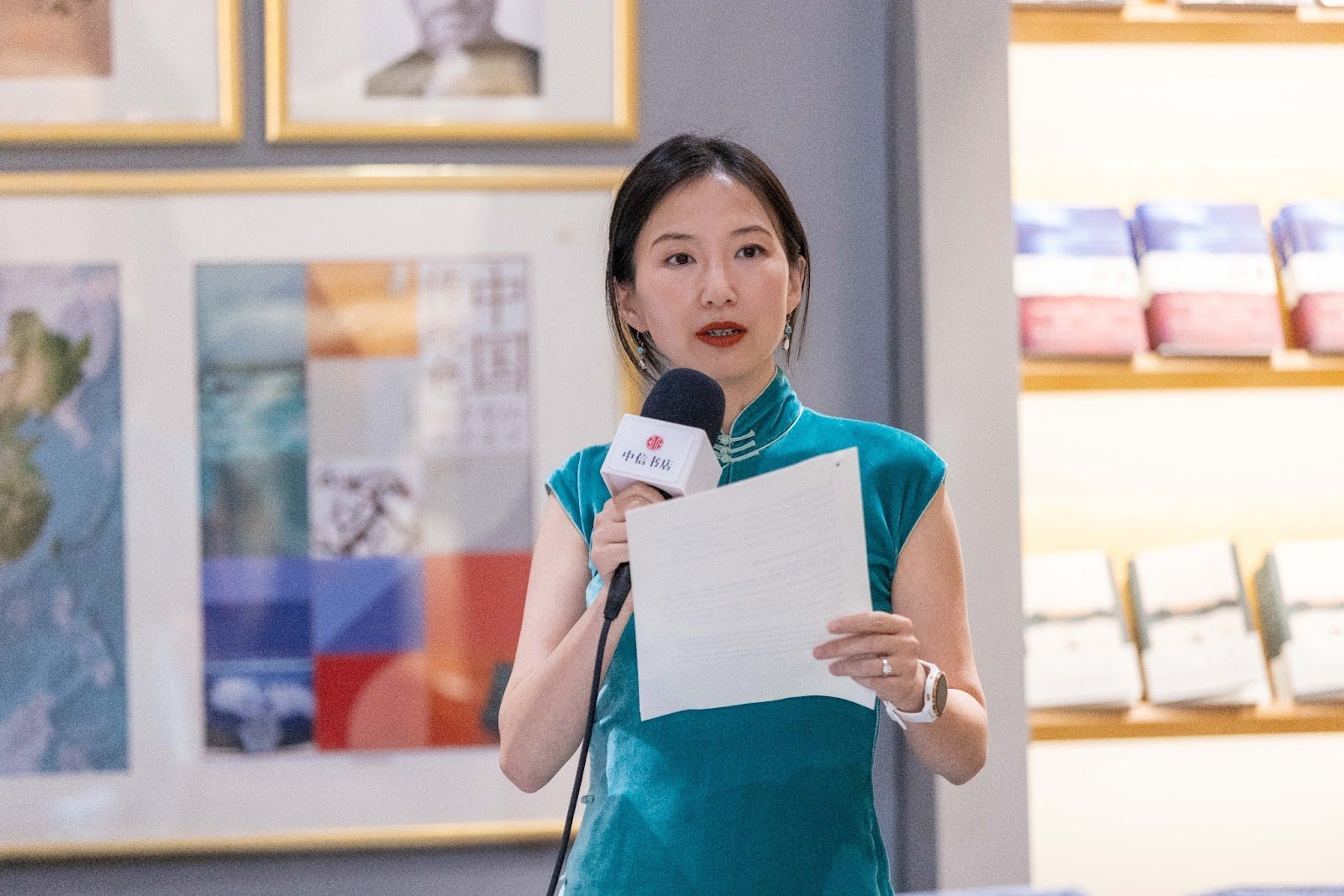
Xu expanded the discussion by probing the question of “why do humans create and spread fake news and rumors?” For instance, during the United States presidential election in 2016, there were rumors that Hillary Clinton was engaged in rituals of killing infants. Yet, this seemingly absurd conspiracy theory influenced voters’ minds. Addressing this example, Boyer pointed out that information dissemination serves two purposes in society: first, to provide valuable knowledge for others, and second, to grant certain social status to the informant. In some societies, the elderly are considered more respectable because they possess more experience and knowledge that others can reference. Hence, those who spread rumors may not necessarily believe their content, but rather do so in the hopes of playing the role of an “informant” in society. This thereby raises their own social status and influence.
In response to the above questions, Yan put forth his analysis from a sociological angle. While nature gave humans the capacity for basic emotions and cognitive capabilities, society wove these intuitive abilities into a common value system. Therefore, society does not shape a person from a blank slate but depends on the psychological structures within humans. Similarly, societal and faith systems are not constructed out of thin air but are built upon the psychological intuition inherent throughout human evolution. Furthermore, the creation of rumors tends to be related to a crisis of trust in society. When people lose trust in public institutions such as the media and the government, they will rely on non-official channels to ease their uncertainty. Yan highlighted that rumors are a societal symptom, indicating attempts made by social groups to restore coherence and public trust.
In addition, Boyer argued that from an evolutionary standpoint, humans are not simply inclined to believe any negative information but are particularly sensitive to one type of negative information – that which threatens our social or natural environment. This is rooted in a cognitive mechanism of “threat sensitivity” preserved by natural selection. For example, when faced with these two statements, “10% of those with cardiovascular diseases will die within five years” versus “90% of those with cardiovascular diseases will still survive within five years”, many will find the former more credible. This judgement is grounded in a human intuition to sense threats. Negative information is often difficult to verify because verification itself comes with risks that could be detrimental. Hence, people would rather believe misinformation to avoid potential danger. Similar cognitive mechanisms can be found in superstitions. One sees this in a folk superstition in Southern Europe, where people believe that if the first person you see in the morning is a priest, your day will be filled with misfortune. Some would even go so far as to return to bed, as this act gives them psychological comfort by allowing them to feel like they can start their day again.
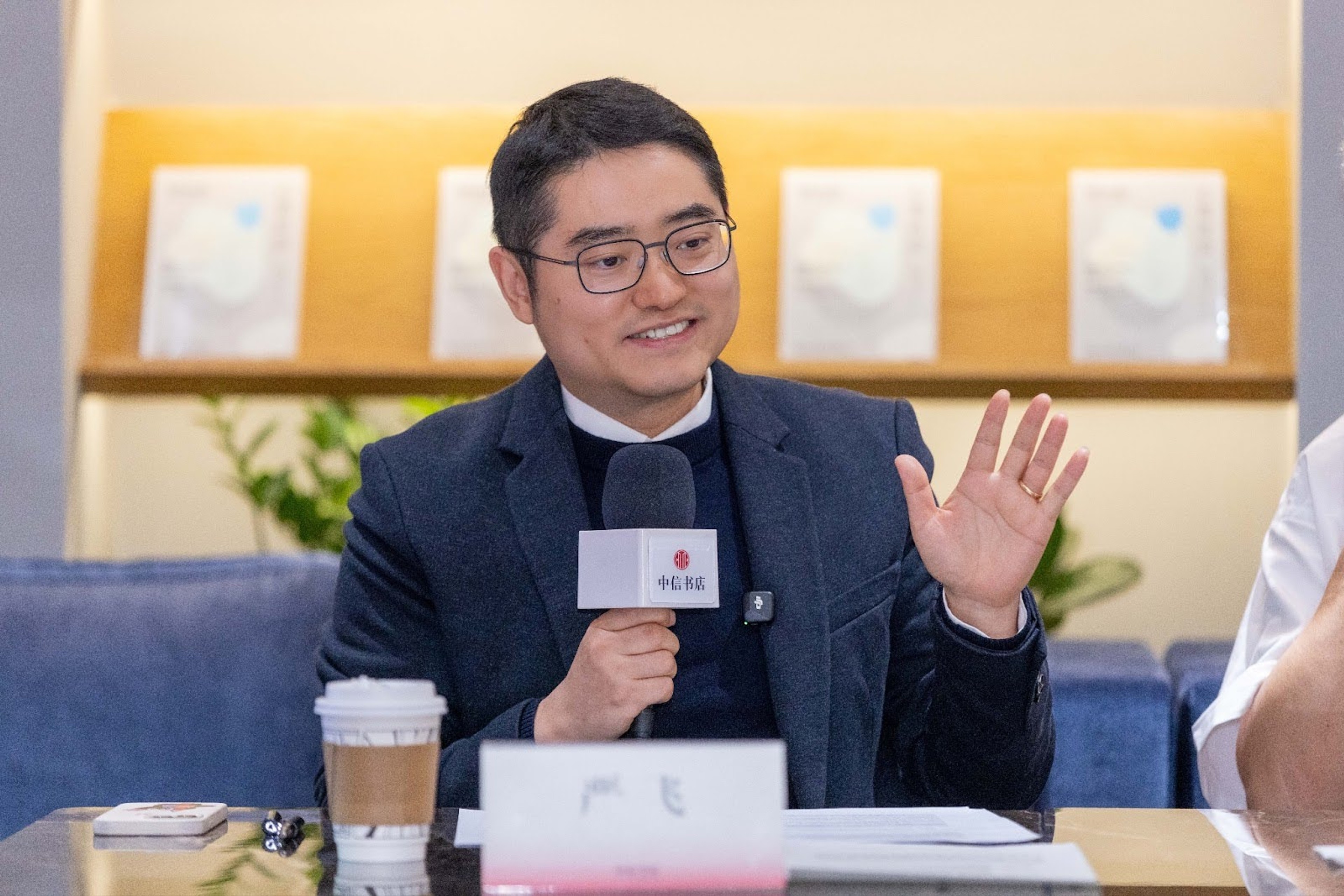
Yan supplemented the discussion with an anecdote. During the pandemic, Yan once went out into the streets to offer free flowers to passerby, hoping to convey support amid the stressful atmosphere. Yet, to his surprise, Yan found that most people refused his flowers and doubted the intentions behind his act. People were worried that the flowers concealed ulterior motives, like stealing personal information after they scanned a QR code to leave their contact details. Through this social experiment, Yan observed that when society is going through a major crisis, fear erodes trust between people. In a climate of instability, the spread of rumors can ironically unite people, allowing them to regain a sense of control and belonging.
Disgust and Societal Boundaries
Xu argued that while rumors do exist, humans have a way of distinguishing false information known as epistemic vigilance. For instance, when the same false information is repeated, this creates the same effect as “to cry wolf.” Even though a tendency toward gullibility and epistemic vigilance may seem paradoxical, both can coexist within the framework of evolutionary psychology. Boyer expanded on this idea by referencing research in child psychology, which suggests that the two are not incompatible. Humans lean towards believing in information they find useful to them. This characteristic is apparent in children. When an adult tells a child that eating vegetables is good for their health, the child often would not believe it.
Yan noted that people tend to fail to uncover the underlying structural causes of issues. When every society teaches us who deserves our compassion and who ought to be blamed, we cultivate a sense of disgust or aversion through these social practices. When the emotion of “disgust” becomes attached to factors such as labor, race, class, gender, and religion, boundaries between different social groups are solidified. This creates the dichotomy of “us” versus “them.” More importantly, Yan emphasizes that the boundaries between “us” and “them” are not permanent. They are built by humans through history, culture, and power, and hence can also be deconstructed by the very same means. Albeit a gradual process, there lies hope in the future that the boundaries can be permeated through humans sharing stories with one another and opening up their hearts to be filled with empathy.
From a psychological perspective, Boyer further examined the components that constitute the emotion of disgust. For instance, even within the same social group, individuals can have wildly varying levels of sensitivity towards contagion. While one person may be conscious of germs and refuse to use someone else’s cup, others may be completely indifferent to sharing. These different levels of sensitivity to contagion matter and can impact social attitudes. In the United States, those who have higher levels of contagion sensitivity tend to more readily accept social labels, such as viewing migrants as a source of danger and a problematic community. This sentiment is exploited by political institutions to exclude certain groups from public spaces in the name of maintaining security or order. In reality, society takes problems seriously only when its reputation is at stake. The same is true for disgust. The evolution of disgust as an emotion is linked to sources of threat in the surrounding environment, such as germs and predators. On the other hand, socially constructed disgust is often a tactical result of political strategy. Political institutions deliberately aggravate negative emotions to polarize groups because a common feeling of disgust can quickly create a temporary sense of solidarity.
In Boyer’s recent research, he focused on the social phenomenon of victim-blaming. He suggested that perhaps people may blame victims because the latter trigger a deeper psychological defense mechanism. Those who confide their misfortunes implicitly wish to receive support and compassion. However, emotional support is a finite resource and we are unable to give unconditional support to everyone. Hence, this prompts a “self-defense mechanism” that leads people to put the blame on the victim in order to reduce their own emotional burden and supportive duties. Boyer believes that this self-defense reaction is closely related to how humans collaborate with each other in society. Within social groups, individuals allocate responsibility to conserve society’s finite resources. When the misfortunes of others become costly in terms of material or emotional support, people may choose to blame the victim to rationalize their own decision for not providing support.
Audience Interaction
During the Q&A session, an audience member asked: “How are environments with high levels of trust, such as religious cults or political rallies, created? In these scenarios, why do people continue to believe despite hearing or witnessing contradictory evidence? In response, Boyer postulated that social trust is built on the perception of interdependence. This is a notion of “I have to trust others because they trust me.” When one realizes that their survival depends on others, trust is built. In a counterintuitive fashion, the characteristic of a high-trust society is that its level of trust can decline. This is because any hiccup in the workings of its institutions and individuals will be amplified into bigger problems, possibly causing the entire system to collapse.
Another audience member sought to clarify the distinction between the concepts of trust and belief: Are moral norms a product entirely of social contract? Does morality exist independent of society? Boyer explained that social conventions and moral norms are indeed fundamentally different. Social conventions are culturally relative and those who violate them unknowingly may still be excused. However, moral norms are widely held to be universal and irrevocable. We feel obliged to abide by foundational moral principles even when no one tells us to.
---
Drafted by Berggruen Intern WULAN Tuoya and HSU Shi En
About the Speakers
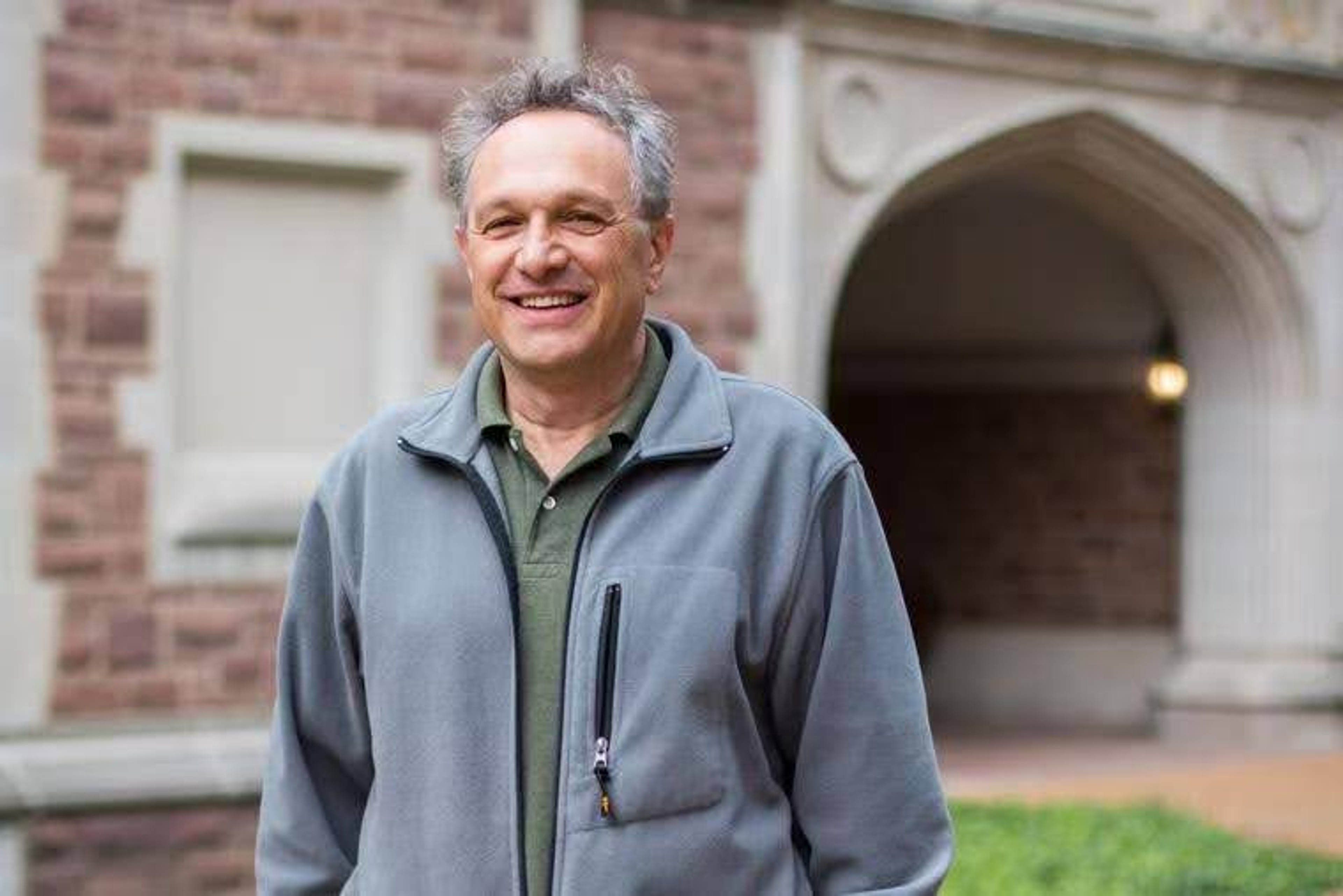
Pascal Boyer
Henry Luce Professor of Anthropology & Psychology, Washington University in St. Louis
Pascal Boyer is a member of the American Academy of Arts and Sciences, a lifetime fellow of the International Society for Cognitive Science and the Association for Psychological Science, and the recipient of numerous honors including the Guggenheim Fellowship and the Fyssen Foundation International Prize. He is a leading figure in cognitive anthropology and evolutionary psychology in Europe and the United States, and a pioneer in Cognitive Science of Religion. He studied philosophy and anthropology at the University of Paris and the University of Cambridge, and has held appointments or visiting positions at institutions including Cambridge, Stanford University, the University of Lyon, and the University of California. He has published six monographs, edited three scholarly volumes, and authored more than one hundred academic articles. Among his classic works, Religion Explained has been translated into twelve languages, while his most recent book, Minds Make Societies, has already appeared in Chinese translation (CITIC Press).

YAN Fei
Associate Professor of Sociology at Tsinghua University
His research focuses on historical sociology, political sociology, and cultural sociology. Yan held fellowships at the Radcliffe Institute for Advanced Study and the Harvard-Yenching Institute at Harvard University, as well as at the Shorenstein Asia-Pacific Research Center at Stanford University. He has authored numerous books in Chinese, including 《世界作为参考答案》(The World as a Reference to Answer), 《悬浮:异乡人的都市生存》(Suspended: The Urban Survival of Outsiders), and 《穿透:像社会学家一样思考》(Penetrating: Thinking Like a Sociologist).
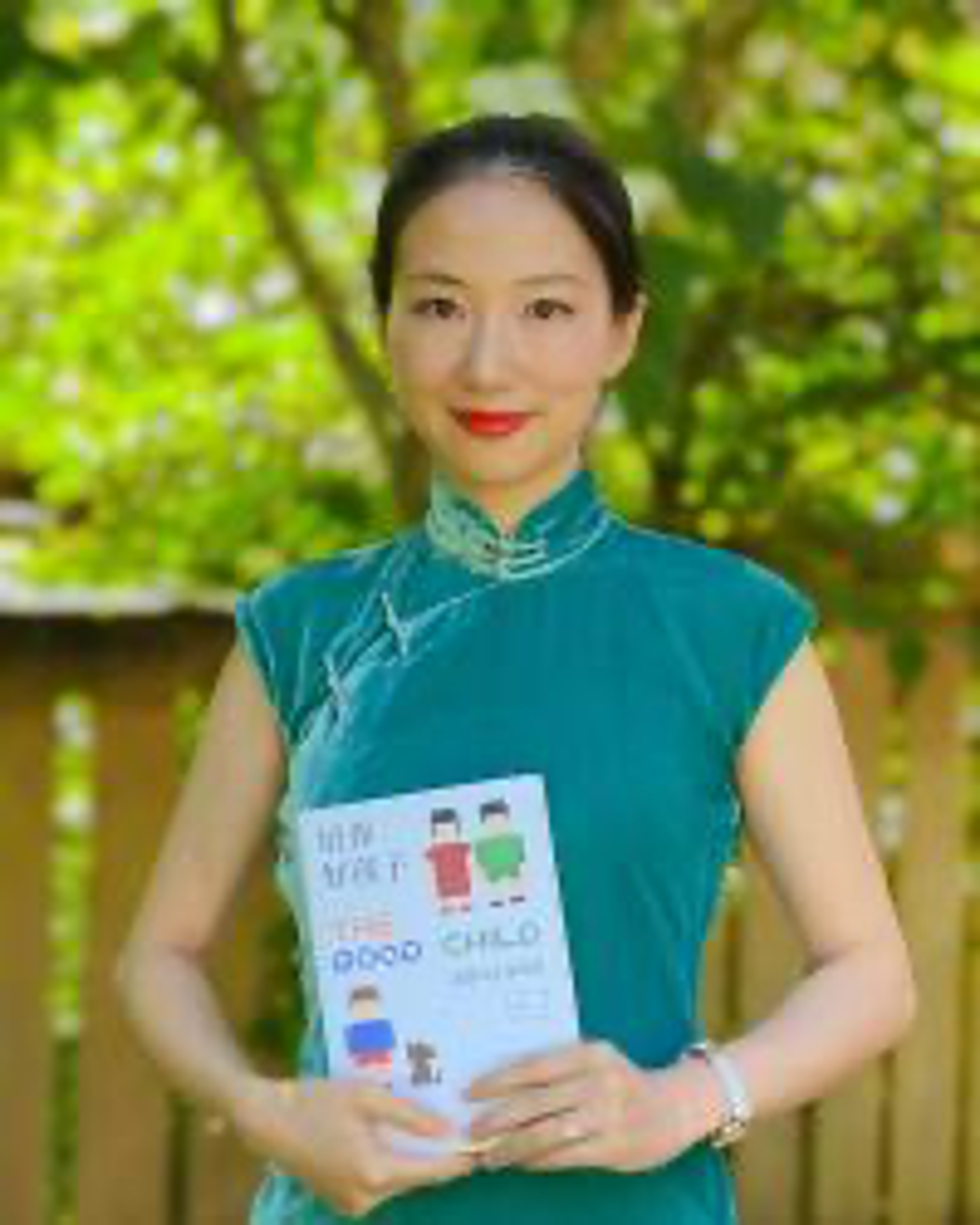
XU Jing
Research Scientist, Department of Anthropology, University of Washington (Seattle)
After receiving her bachelor’s and master’s degrees from Tsinghua University, and she obtained her Ph.D. in anthropology from Washington University in St. Louis, under the supervision of Professor Pascal Boyer. Her research integrates anthropology and cognitive science, using children’s moral development as a lens to explore what it means to be human. She has published extensively, including two English-language monographs: The Good Child (Stanford University Press, 2017) and “Unruly” Children (Cambridge University Press, 2024). Her first monograph was translated into Chinese, as part of the popular ethnography series “Mint Experiment.” She currently serves as Associate Editor of the journal American Anthropologist.
About CITIC Bookstores
CITIC Bookstores operate under the CITIC Publishing Group. It adheres to the development concept of "enhancing the value of each reader's unit time" and integrates carefully selected books, cultural and creative products, reader community spaces,and fine dining to upgrade the traditional bookstore model into a composite cultural lifestyle destination.

